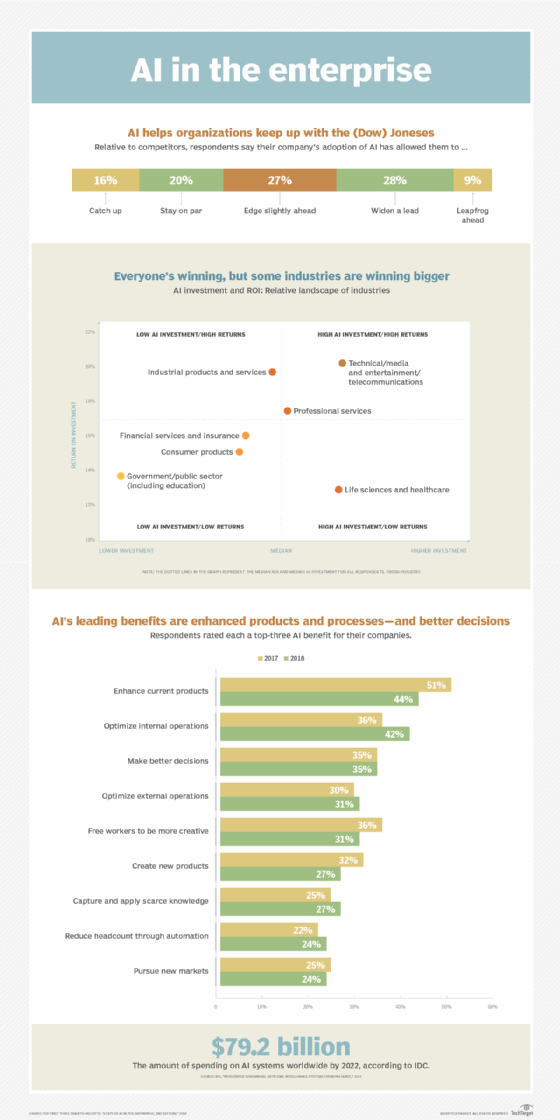
Value of AI in capitalizing on big data, expanding automation
The strategic value of AI in business is growing as companies learn how to use AI technologies to capitalize on big data, drive automation and better serve customers.
The volume of data generated worldwide is soaring, with research firm IDC predicting that by 2025 the global datasphere will reach 175 zettabytes, up an astounding 430% from 33 zettabytes in 2018.
"There's a huge amount of data that companies have been able to capture, internal and external data, structured and unstructured data. And it has become very important for organizations to use all the data available to make data-driven decisions," said Madhu Bhattacharyya, managing director and global leader of Protiviti's enterprise data and analytics practice.
Any enterprise that wants to make use of its data stores must harness the power of artificial intelligence: AI technologies are required to digest these massive data sets; and AI needs vast stores of data in order to get better at making accurate predictions. "In that way, the use of AI is going to give an organization a competitive edge," Bhattacharyya said.
From enabling companies to deliver smoother customer experiences to helping them establish new business lines, AI provides a strategic value to businesses akin to the strategic value of electricity in the early 20th century, when electrification transformed industries like transportation and manufacturing and created new ones, like mass communications.
 Madhu Bhattacharyya
Madhu Bhattacharyya
"AI is strategic because the scale, scope, complexity and the dynamism in business today is so extreme that humans can no longer manage it without artificial intelligence. AI is a competitive necessity that business has to deploy," said Chris Brahm, a partner and director at Bain & Co., and leader of the firm's global advanced analytics practice.
 Chris Brahm
Chris Brahm
Much of AI's strategic value is based in the technology's ability to quickly identify patterns in data, even subtle or rapidly shifting ones, and then to learn how to adjust processes and procedures to produce the best outcome based on the information it uncovered.
As such, AI is being used to analyze vast volumes of data to create more personalized experiences for customers. And it is being used to sort large data sets to identify and perform tasks that it can be trained to handle more efficiently than humans. Tasks that require creativity are shifted to human workers to complete, thereby boosting overall organizational productivity.
"AI is very important to the enterprise in two main ways, namely automation and augmentation. Automation allows companies to scale their operation without the need to add more headcounts, while augmentation increases productivity and optimizes internal resources," said Lian Jye Su, a principal analyst at ABI Research.

The importance of AI in advancing automation
AI can produce significant productivity gains for organizations by handling mundane, repetitive tasks and performing them at an exponentially higher scale, pace and accuracy than humans can. This leaves employees to focus on more of the business's higher-value functions, thereby layering efficiency gains on top of the productivity boost that the technology delivers.
 Lian Jye Su
Lian Jye Su
When described as such, AI seems identical to automation technologies such as robotic process automation (RPA). There is a significant difference between the two types of technology. With RPA, workers use identified steps in a targeted business process to configure the RPA software, tasks that the software bots then perform as they're programmed to do.
On the other hand, AI uses data to generate the most efficient process and then, when combined with some automation software such as RPA, will perform the process to top efficiency. AI then can continue to refine its approach, as it identifies more efficiencies to bring to the process.
AI-enabled systems help human workers do their jobs better
If highly efficient automation is one of the biggest values that AI delivers, the other is its capability to provide on-the-job support for human workers.
"AI makes it easier for the human to interact with the information," said Seth Earley, author of The AI-Powered Enterprise and CEO of Earley Information Science.
 Seth Earley
Seth Earley
The ability of AI to analyze data and then draw conclusions from it aids and augments a long list of varied tasks performed by humans. AI can assist doctors in making medical diagnoses. It can take in customer data and other information to suggest to retail associates which sales pitches to make. It can analyze that same data together with the customer's voice to identify the customer's emotional level for call center workers and provide ways to adjust the interaction to reach the optimal outcome.
The importance of AI in business functions like finance and security is growing. AI can sort through reams of financial and industrywide statistics along with economic, consumer and specific customer data to help insurance companies, banks and the like in their underwriting procedures. AI can take automated action against cyber threats by analyzing IT systems, security tools and information about known threats, alert internal cybersecurity teams to new problems, and prioritize the threats that need human attention.
Just as AI can surpass the automation capabilities of RPA, AI also goes beyond the data-driven insights produced with current technologies such as business intelligence tools. While both data analytics technologies and AI analyze data, AI utilizes its intelligence components to draw conclusions, make recommendations and then guide human workers through processes, adjusting its recommendations as a process unfolds and as it takes in new information in real time. That, in turn, allows the AI to continuously learn and refine its conclusions and improve its recommendations over its entire lifecycle.
"What AI is doing is processing information throughout the organization; and it's speeding that flow so we can react more quickly, be more agile and meet needs more effectively," Earley said.
AI for big data, augmentation enables businesses to compete effectively
But efficiency and productivity gains delivered by AI-powered automation and augmentation is only part of the strategic importance of AI in business operations.
More significant, experts said, is the fact that AI gives organizations the ability to compete in a marketplace where customers, employees and partners increasingly expect the speed and personalization that the automation and augmentation deliver.
"AI is strategically important because it's building the capabilities that our customers demand and that our competitors will have," Earley said, saying that AI is the "digital machinery" that delivers the results that all those stakeholders want.
 Karen Panetta
Karen Panetta
AI's role in using data to automate and enhance human work creates (and will continue to drive) cost-saving opportunities, improved sales and new revenue streams.
"Data is becoming overwhelming," said Karen Panetta, a fellow with the technical professional organization IEEE and Tufts University professor of electrical and computer engineering, "so if you're not going to use these new AI technologies, you'll be left behind in every aspect -- in understanding customers, new design methods, in efficiency and in every other area."







